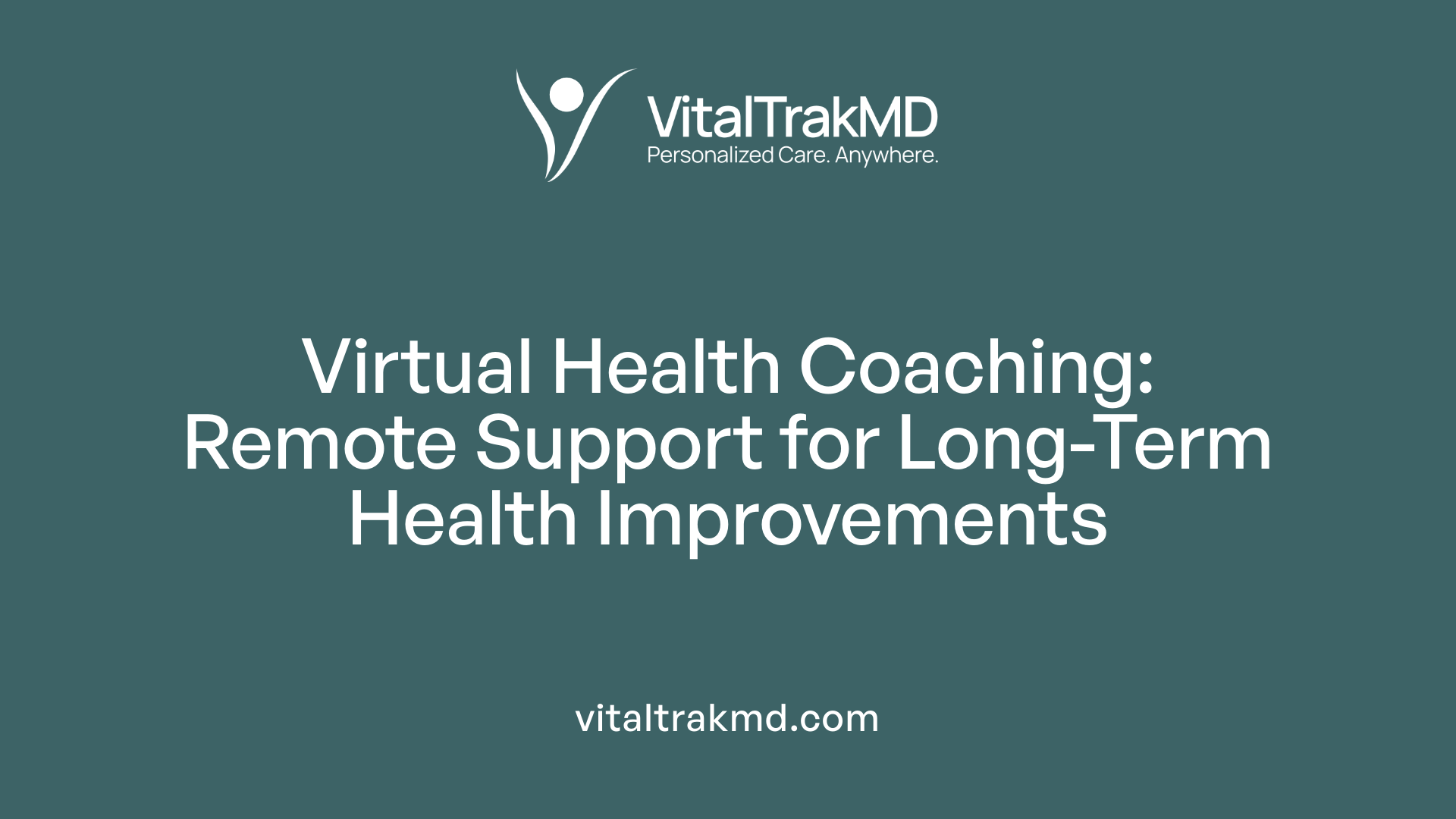How Personal Health Coaching Improves Long-Term Outcomes

Introduction to Long-Term Health Benefits of Personal Coaching
In recent years, personal health coaching has emerged as a transformative approach in healthcare, emphasizing sustained behavior change and long-term health outcomes. As evidence accumulates, it becomes clear that coaching strategies can empower individuals to take control of their health journeys, leading to measurable improvements in physical, psychological, and behavioral health variables. This article explores how coaching interventions, backed by scientific research, contribute to enduring health benefits and integrate effectively with healthcare systems.
The Evidence Base: Systematic Reviews and Research Findings

What is health coaching and how does it contribute to long-term health improvement?
Health coaching is a collaborative, personalized approach that helps individuals achieve their health goals by promoting behavior change, providing education, and fostering motivation. Trained health coaches work with clients to set realistic, specific health objectives, develop tailored strategies, and support ongoing efforts to adopt healthier lifestyles.
A comprehensive systematic review of 28 studies clearly demonstrates that health and wellness coaching can produce sustained or improved health outcomes over time. The review found that 25 out of these 28 studies reported at least partial, full, or ongoing improvements across various health-related variables following coaching interventions.
These positive outcomes span multiple domains, including physiological measures like blood pressure, cholesterol, and blood sugar levels; behavioral changes such as increased physical activity and better diet; and psychological factors like self-efficacy, depression, and stress management. Notably, many of these outcomes, particularly psychological and health risk assessment measures, tend to be more likely to be maintained or improved over time.
The research indicates that health coaching effectively supports lasting behavior modifications that persist even after the formal coaching relationship ends. For instance, studies involving nursing-home residents with chronic conditions and cognitive impairments showed significant improvements in self-efficacy, goal attainment, and quality of life at both short-term (week 9) and long-term (week 20) follow-up points. Participants also maintained physical health, experienced reduced depression and health distress, and showed no deterioration in respiratory symptoms.
Furthermore, interventions utilizing motivational interviewing and positive psychology principles—focused on individuals' strengths and motivations—have been linked to noteworthy clinical improvements. These include lower blood pressure, cholesterol, fasting glucose, and body weight, alongside enhanced medication adherence and reduced stress levels. For example, in populations with chronic diseases like COPD, health coaching has been associated with fewer hospitalizations and better quality-of-life scores.
Studies from varied settings, including telehealth, group formats, and underserved areas, attest to the flexibility and broad applicability of health coaching. Remote delivery methods, such as phone or internet-based coaching, have been shown to be as effective as face-to-face interactions, expanding access to diverse populations.
Cost analyses, such as those by Medica Health Plans, reveal that health coaching programs can lead to significant healthcare savings. Participants experienced reductions in hospital admissions, emergency visits, and overall healthcare costs, underscoring the value of incorporating coaching into healthcare systems.
In sum, current research offers compelling evidence that health coaching can initiate and sustain health improvements across various populations and health conditions. While the overall strength of evidence varies, especially due to some methodological limitations, the consistent positive findings support its role as a valuable tool for promoting long-term health and well-being.
Sustained Improvements: Physiological, Behavioral, and Psychological Gains

What are the benefits of health coaching for long-term health and well-being?
Health coaching offers valuable support for individuals seeking lasting improvements in their overall health and lifestyle. It works by helping clients set realistic goals, develop personalized strategies, and stay motivated to maintain healthier habits over time. Evidence from various studies shows that health coaching can lead to meaningful and enduring health benefits.
A systematic review of 28 studies highlights that most participants who engaged in health coaching experienced sustained or improved outcomes across multiple health variables. These benefits include improvements in physiological markers such as blood pressure, cholesterol, blood glucose, body weight, and waist circumference. Such changes are clinically relevant, reducing risks associated with chronic diseases like heart disease and diabetes.
Behavioral and psychological gains are also notable. Many individuals show increased self-efficacy—the confidence to manage their health—along with better adherence to medications and healthier lifestyle choices. Psychological improvements include reductions in perceived stress, depression, and health distress, which contribute to overall well-being.
For example, a program conducted among nursing-home residents with chronic conditions and mild cognitive impairment demonstrated significant benefits. Participants showed increased goal attainment, improved self-efficacy, and a better quality of life, with these gains maintained months after the intervention ended. These results underscore coaching's ability to support long-term health and psychological resilience.
Health coaching techniques such as motivational interviewing and positive psychology—focusing on individuals' strengths—further enhance the potential for sustainable health improvements. Whether delivered face-to-face, remotely via phone or internet, or in group settings, coaching adapts to different needs and settings.
In summary, health coaching not only helps individuals initiate healthy changes but also supports their ability to sustain these over time, ultimately leading to better health outcomes and enhanced quality of life.
Mechanisms Underpinning Long-Term Change in Health Behavior

How does health coaching support behavior change and the management of chronic conditions?
Health coaching plays a vital role in helping individuals make lasting health behavior changes and effectively manage chronic diseases. It centers on establishing a collaborative, patient-focused relationship that empowers clients to take control of their health journey.
One of the core components of health coaching is the use of specific behavior change techniques. Techniques such as motivational interviewing help elicit personal reasons for change, increasing internal motivation. Goal-setting frameworks like SMART goals (Specific, Measurable, Achievable, Relevant, Time-bound) provide clear direction, while self-monitoring tools encourage accountability. Methods like teach-back ensure understanding, reinforcing new skills and knowledge.
Beyond techniques, health coaching enhances patient capacity by addressing multiple domains, including psychological, social, and environmental factors. This comprehensive approach helps patients develop sustainable routines related to diet, exercise, stress reduction, and medication adherence.
The psychological pillars of motivation and self-efficacy are fundamental. When individuals believe they can succeed (self-efficacy) and have strong motivation, they are more likely to sustain healthy behaviors over time. Health coaches work to boost these attributes by celebrating small wins, providing positive reinforcement, and tailoring interventions to individual values and cultural contexts.
Health literacy is equally important. Coach-led education increases understanding of health conditions and treatment plans, enabling patients to make informed decisions. Technology integration, such as telehealth services and digital apps, further supports ongoing engagement and accessibility.
Research demonstrates that these combined strategies not only facilitate initial behavior change but also reinforce it long-term. Patients are more likely to adhere to medication regimes, maintain physical activity routines, and adopt healthier dietary habits. This sustained engagement leads to improved health outcomes, including better blood sugar and blood pressure control, ultimately reducing the risk of complications.
In summary, health coaching influences health behaviors through a blend of motivational techniques, capacity building, personalized support, and ongoing reinforcement, making it an effective approach for managing chronic conditions over the long term.
The Role of Health Coaches in Various Settings

What role does team-based health coaching play in healthcare?
Team-based health coaching has become an essential element in delivering comprehensive and patient-centered healthcare. It involves collaboration among various healthcare professionals, including nurses, medical assistants, care coordinators, and health coaches, working together to support patients with chronic conditions, mental health issues, or health risk behaviors.
This approach focuses on identifying patient goals, creating personalized care plans, and addressing barriers to change. By doing so, health coaches facilitate sustained behavior modifications, improve treatment adherence, and promote self-efficacy. This collaborative model not only enhances patient outcomes but also contributes to more efficient use of healthcare resources.
Evidence indicates that integrating health coaching into team-based care can lead to reductions in hospital readmissions and healthcare costs. It also supports clinician well-being by sharing the workload and fostering a culture of shared decision-making and psychological safety.
In primary care, community health programs, and telehealth settings, health coaches serve as vital links between patients and providers, ensuring continuous support and engagement. They help translate medical advice into actionable steps, empowering patients to manage their health actively.
Training and qualifications for health coaches
Quality standards for health coaching personnel are critical to ensure effective service delivery. Professionals often undergo specialized training, such as the Wellcoaches certification, the National Board for Health & Wellness Coaching (NBHWC) credential, or other accredited programs. Typically, training includes courses on motivational interviewing, behavior change techniques, health assessment, and personalized care planning.
For clinicians involved as health coaches, minimum standards often involve two to four days of focused education, emphasizing patient-centered communication, coaching methods, and ethical practices. Ongoing professional development and adherence to established guidelines help maintain high-quality coaching practices.
Choosing qualified health coaches involves reviewing credentials, experience, and adherence to standards. Many programs also emphasize training in cultural competence and working with underserved populations, ensuring that health coaching is accessible, effective, and equitable.
In summary, effective team-based health coaching relies on well-trained professionals equipped with the skills to motivate, educate, and empower patients across diverse healthcare settings, ultimately fostering better health outcomes and higher quality care.
Virtual Health Coaching: Efficacy and Accessibility

How effective are virtual health coaching interventions for long-term health improvements?
Virtual health coaching has shown promising results in supporting sustained health improvements across various populations. Multiple studies and systematic reviews indicate that even when delivered remotely, health coaching can lead to meaningful, lasting changes in health behaviors and outcomes.
Research highlights that virtual coaching helps maintain weight loss after bariatric surgery, with participants showing continued progress months after initial intervention. It also enhances quality of life, self-efficacy, and mental health, especially among those managing chronic conditions. Caregivers participating in virtual stress reduction and self-care programs reported decreased perceived stress and improved self-management skills.
These interventions are typically delivered through video calls, interactive apps, or online platforms that enable personalized coaching sessions. Such methods allow healthcare providers and coaches to tailor support to individual needs while offering the flexibility to fit into busy schedules.
While some studies note heterogeneity and certain limitations in research quality, the overall evidence suggests that remote health coaching is a reliable tool for long-term health gains. Participants benefit from continuous encouragement, accountability, and tailored strategies, which foster sustained behavior change.
In summary, virtual health coaching effectively extends the reach of traditional healthcare, providing long-lasting benefits for diverse populations, including those with chronic illnesses, post-surgical patients, and caregivers. Its accessibility and proven impact make it an important component of modern health management.
Cost-Effectiveness and Healthcare Utilization Reduction
Research consistently shows that health coaching not only improves health outcomes but also has a significant impact on healthcare utilization and costs. Various studies reveal that patients engaging in structured coaching programs tend to have fewer hospitalizations and emergency visits, leading to reduced healthcare expenditures.
For instance, Medica Health Plans' program launched in 2008 demonstrated an 18% reduction in inpatient utilization and a 12% drop in emergency department visits within the first six months of participation. Participants also experienced notable health improvements, such as better cholesterol levels and BMI, and increased confidence in managing their health.
Additionally, analyses from different settings highlight that long-term health coaching can result in substantial cost savings. A rehabilitation ward in Hampshire reported approximately £3 million in reduced costs, attributed to fewer hospital stays and lower demand for acute care services.
Economic evaluations further confirm the financial benefits. For example, participants in various programs have shown a decrease in healthcare spending by around $139 per member per month after several months of coaching, and some programs even broke even financially through savings achieved.
The impact on utilization extends beyond directly measured costs. Reductions in hospital admissions and emergency visits contribute to easing the burden on healthcare systems, especially in managing chronic illnesses. These savings are especially crucial in underserved populations, where access and health literacy improve through coaching, leading to better disease management and fewer preventable hospitalizations.
Therefore, integrating health coaching into healthcare services appears to provide a valuable tool for increasing system efficiency while supporting patients' long-term health.
Real-World Applications and Population Impact
How is health coaching implemented in healthcare systems?
Health coaching is increasingly integrated into various healthcare settings, aiming to enhance patient engagement, improve health outcomes, and reduce long-term costs. Many programs utilize flexible formats, including face-to-face sessions, telehealth services, group coaching, and digital platforms, making it accessible for diverse populations. For example, some systems embed health coaches into primary care or chronic disease management programs, where they work alongside physicians and nurses to provide personalized support.
The effectiveness of health coaching relies on structured approaches that include training clinicians in motivational interviewing and behavior change techniques. Accreditation and standardization are important; for instance, NHS programs require health and wellbeing coaches to undergo minimum training of four days, ensuring quality and consistency.
System-wide commitment involves resource allocation for training, infrastructure for remote delivery, and protocols for evaluating outcomes. Successful systems emphasize co-production—collaborating with patients to design interventions—and adhere to established standards, ensuring scalability and sustainability.
Research from organizations like the VA and NHS highlights that integrated health coaching can significantly lower hospital readmissions, improve medication adherence, and foster long-term lifestyle improvements. This approach not only benefits individual patients but also alleviates pressure on healthcare resources.
Which specific populations benefit most from health coaching?
Certain groups derive notable benefits from tailored health coaching interventions, especially those managing chronic conditions or facing health disparities. Older adults and nursing-home residents with chronic illnesses and cognitive impairments show improvement in self-efficacy, goal achievement, and overall quality of life through programs like the HCSMP-NHR.
Patients with complex or poorly controlled conditions such as diabetes, hypertension, and COPD experience better clinical indicators when supported by health coaches. For example, coaching has been linked to reductions in blood pressure, cholesterol, and weight, alongside increased treatment adherence.
Vulnerable populations— including low-income groups, racial and ethnic minorities, and residents of rural or underserved areas—benefit significantly from accessible, culturally sensitive coaching. Remote delivery via phone or internet helps overcome geographical and resource barriers, increasing health literacy and self-efficacy.
Caregivers of patients with chronic illnesses also benefit; a virtual coaching program for caregivers of heart failure patients improved self-care behaviors and stress management, leading to better patient support and decreased caregiver burden.
Workplace cohorts and employees participating in wellness coaching have reported improved well-being, reduced stress, and healthier habits, which translate to better productivity and health cost savings.
What is the role of health coaching in managing chronic conditions and supporting behavior change?
Health coaching plays a vital role in managing chronic conditions and encouraging sustainable behavior changes. It fosters a collaborative, patient-centered relationship that empowers individuals to actively participate in their health journey.
Using techniques like motivational interviewing, active learning, self-monitoring, and teach-back methods, coaches help patients identify personalized goals and develop tailored strategies. This approach considers multiple aspects of patient capacity—social, psychological, and environmental—enabling the building of long-lasting habits in nutrition, physical activity, stress management, and medication adherence.
Ongoing support from health coaches reinforces positive behaviors, helping to maintain improvements after formal coaching ends. It also enhances health literacy, making patients more confident in managing their conditions. For example, in diabetes care, coaching has led to better blood sugar control and medication adherence.
Culturally sensitive interventions, delivered through various platforms like telehealth or group sessions, maximize engagement and effectiveness. Overall, health coaching supports a shift from reactive, disease-centered care to proactive health management, improving clinical outcomes and enhancing patients’ quality of life.
Conclusion: Transforming Healthcare with Personalized Coaching
The accumulating scientific evidence affirms that personal health coaching significantly enhances long-term health and well-being. By employing evidence-based techniques and fostering collaborative care models, coaching supports sustainable behavior change, improves clinical outcomes, and reduces healthcare costs. Its effectiveness spans diverse populations and settings, including virtual platforms, making it a versatile and integral component of modern healthcare. As healthcare systems continue to embrace patient-centered approaches, integrating professional, tailored coaching will be key to achieving lasting health improvements and fostering healthier communities.
References
- Health and Wellness Coaching and Sustained Gains: A Rapid ...
- The long-term effects of the health coaching self-management ...
- Health coaching is effective. Should you try it? - Harvard Health
- The Benefits of Health Coaching for Patients and Practitioners
- Case Study: Health Plan–Led Coaching Program Leads to Improved ...
- Study finds wellness coaching benefits last over time - Mayo Clinic
- The impact of health and wellness coaching on patient-important ...
- Health Coaching Services: 7 Powerful Benefits in 2025 - LifeSTEPS
Recent articles
Want to Feel Better and Live Healthier?
Join hundreds of patients taking control of their health with personalized care that fits their life – not the other way around.
Rated 4.8/5 by 32+ customers







